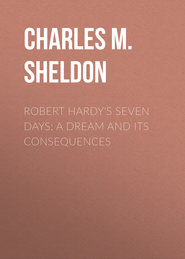По всем вопросам обращайтесь на: info@litportal.ru
(©) 2003-2024.
✖
The Crucifixion of Philip Strong
Автор
Год написания книги
2019
Настройки чтения
Размер шрифта
Высота строк
Поля
"Brother Man," said Philip, cheerily, "come in and rest yourself."
"Can you keep me over night?"
The question was put wistfully. Philip was struck by the difference between this almost shrinking request and the self-invitation of a month before.
"Yes, indeed! We have one spare room for you. You are welcome. Come in."
So they went in, and after tea the two sat down together while Mrs. Strong was busy in the kitchen. A part of this conversation was afterward related by the minister to his wife; a part of it he afterward said was unreportable–the manner of tone, the inflection, the gesture of his remarkable guest no man could reproduce.
"You have moved since I saw you last," said the visitor.
"Yes," replied Philip. "You did not expect me to act on your advice so soon?"
"My advice?" The question came in a hesitating tone. "Did I advise you to move? Ah, yes, I remember!" A light like supremest reason flashed over the man's face, and then died out. "Yes, yes; you are beginning to live on your simpler basis. You are doing as you preach. That must feel good."
"Yes," replied Philip, "it does feel good. Do you think, Brother Man, that this will help to solve the problem?"
"What problem?"
"Why, the problem of the church and the people—winning them, saving them."
"Are your church members moving out of their elegant houses and coming down here to live?" The old man asked the question in utmost simplicity.
"No; I did not ask them."
"You ought to."
"What! Do you believe my people ought literally to leave their possessions and live among the people?"
Philip could not help asking the question, and all the time he was conscious of a strange absurdity mingled with an unaccountable respect for his visitor, and his opinion.
"Yes," came the reply, with the calmness of light. "Christ would demand it if he were pastor of Calvary Church in this age. The church members, the Christians in this century, must renounce all that they have, or they cannot be his disciples."
Philip sat profoundly silent. The words spoken so quietly by this creature tossed upon his own soul like a vessel in a tempest. He dared not say anything for a moment. The Brother Man looked over and said at last: "What have you been preaching about since you came here?"
"A great many things."
"What are some of the things you have preached about?"
"Well," Philip clasped his hands over his knees; "I have preached about the right and wrong uses of property, the evil of the saloon, the Sunday as a day of rest and worship, the necessity of moving our church building down into this neighborhood, the need of living on a simpler basis, and, lastly, the true work of a church in these days."
"Has your church done what you have wished?"
"No," replied Philip, with a sigh.
"Will it do what you preach ought to be done?"
"I do not know."
"Why don't you resign?"
The question came with perfect simplicity, but it smote Philip almost like a blow. It was spoken with calmness that hardly rose above a whisper, but it seemed to the listener almost like a shout. The thought of giving up his work simply because his church had not yet done what he wished, or because some of his people did not like him, was the last thing a man of his nature would do. He looked again at the man and said:
"Would you resign if you were in my place?"
"No." It was so quietly spoken that Philip almost doubted if his visitor had replied. Then he said: "What has been done with the parsonage?"
"It is empty. The church is waiting to rent it to some one who expects to move to Milton soon."
"Are you sorry you came here?"
"No; I am happy in my work."
"Do you have enough to eat and wear?"
"Yes, indeed. The thousand dollars which the church refused to take off my salary goes to help where most needed; the rest is more than enough for us."
"Does your wife think so?" The question from any one else had been impertinent. From this man it was not.
"Let us call her in and ask her," replied Philip, with a smile.
"Sarah, the Brother Man wants to know if you have enough to live on."
Sarah came in and sat down. It was dark. The year was turning into the softer months of spring, and all the out-door world had been a benediction that evening if the sorrow and poverty and sin of the tenement district so near had not pervaded the very walls and atmosphere of the entire place. The minister's wife answered bravely: "Yes, we have food and clothing and life's necessaries. But, oh, Philip! this life is wearing you out. Yes, Brother Man." she continued, while a tear rolled over her cheek, "the minister is giving his life blood for these people, and they do not care. It is a vain sacrifice." She had spoken as frankly as if the old man had been her father. There was a something in him which called out such confidence.
Mr. Strong soothed his wife, clasping her to him tenderly. "There, Sarah, you are nervous and tired. I am a little discouraged, but strong and hearty for the work. Brother Man, you must not think we regret your advice. We have been blessed by following it."
And then their remarkable guest stretched out his arms through the gathering gloom in the room and seemed to bless them. Later in the evening he again called for a Bible, and offered a prayer of wondrous sweetness. He was shown to his plainly-furnished room. He looked around and smiled.
"This is like my old home," he said; "a palace, where the poor die of hunger."
Philip started at the odd remark, then recollected that the old man had once been wealthy, and sometimes in his half-dazed condition Philip thought probable he confounded the humblest surroundings with his once luxurious home. He lingered a moment, and the man said, as if speaking to himself: "If they do not renounce all they have, they cannot be my disciples."
"Good-night, Brother Man." cried Philip, as he went out.
"Good-night, Christ's man," replied his guest. And Philip went to his rest that night, great questions throbbing in him, and the demands of the Master more distinctly brought to his attention than ever.
Again, as before when he rose in the morning, he found that his visitor was gone. His eccentric movements accounted his sudden disappearances, but they were disappointed. They wanted to see their guest again and question him about his history. They promised themselves he would do so next time.
The following Sunday Philip preached one of those sermons which come to a man once or twice in a whole ministry. It was the last Sunday of the month, and not a special occasion. But there had surged into his thought the meaning of the Christian life with such uncontrollable power that his sermon reached hearts never before touched. He remained at the close of the service to talk with several young men, who seemed moved as never before. After they had gone away he went into his own room back of the platform to get something he had left there, and to his surprise found the church sexton kneeling down by one of the chairs. As the minister came in the man rose and turned toward him.
"Mr. Strong, I want to be a Christian. I want to join the church and lead a different life."
Philip clasped his hand, while tears rolled over the man's face. He stayed and talked with him, and prayed with him, and when he finally went home the minister was convinced it was as strong and true a conversion as he had ever seen. He at once related the story to his wife, who had gone on before to get dinner.
"Why, Philip," she exclaimed, when he said the sexton wanted to be baptized and unite with the church at the next communion, "Calvary Church will never allow him to unite with us!"
"Why not?" asked Philip, in amazement.








